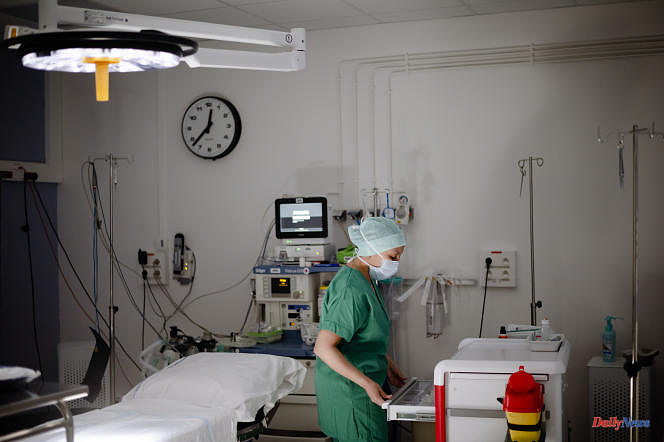While the "immigration and integration" bill is to be presented to the Council of Ministers on Wednesday, February 1, the debate has mounted on the section which provides for the creation of a specific residence permit for jobs in tension, in the first row including those of health. Intended to "improve the attractiveness" of France, this new residence permit for a period of thirteen months to four years called "talent-medical and pharmacy professions" will concern foreign doctors regardless of their specialty, midwives women, dental surgeons and pharmacists. It also plans to lower the income threshold required to qualify.
"Let's not deprive Africa of its doctors", headlined bluntly on January 7 an opinion piece signed by André Grimaldi, Jean-Paul Vernant, Xavier Emmanuelli and Rony Brauman, published in the Sunday Journal (JDD). Respectively Professor Emeritus of Diabetology; Professor Emeritus of Hematology and member of the Committee of Elders of the French Office for Immigration and Integration (OFII); former Secretary of State and Chairman of this Committee of Elders; co-founder of Doctors Without Borders, the four personalities asked the government to "withdraw from its project this proposal (...) to attract medical personnel" which, according to them, will have the effect "of transferring our medical deserts to the countries resulting from our former settlements".
After the European Union (EU), French-speaking Africa is indeed France's leading supplier: Algeria, Morocco and Tunisia in the lead, but also Madagascar, Senegal, Cameroon, Côte d'Ivoire, Benin, Democratic Republic of Congo (DRC).
In 2022, according to the Council of the Order of French Physicians (CNOM), three quarters of the 2,000 practitioners with a diploma outside the EU (Padhue) who took the knowledge verification tests were from the Maghreb, and half from Algeria. Five thousand of these doctors are still waiting for their skills to be validated while they work as interns in the public hospital for a salary that is up to half as much. In total, the Organization for Economic Co-operation and Development (OECD) estimated the number of foreign-born doctors practicing in France at 25,000, i.e. 12% of the total number of registered doctors. A figure that has been multiplied by thirty in twenty years.
"A four-year precariousness"
The National Union of Padhue was quick to declare its perplexity over the "dragging" effect of this new provision, since many of these practitioners are bi-national and therefore do not need residence permits.
“This exodus is largely invisible in the figures of the CNOM, explains Francesca Sirna, sociologist specializing in migrations in charge of research at the CNRS. Most future doctors arrive to follow a specialization or do an internship. As for the Padhue, the bill offers them nothing more than a maximum of four years insecurity, with no guarantee for the future. Their main problem is the validation of skills, which is still a real obstacle course despite the 2020 reform.
The procedure for authorization to practice (PAE) often exceeds four years. "We are creating future clandestine doctors who will not return home", indignant Mohamed Ghannem, a specialist of Tunisian origin who directs the cardiology unit of the hospital center of Gonesse (Val-d'Oise) . A fine connoisseur of the French system, in 1998 he created the Association of Doctors of North African Origin in France, which accompanied all the waves of "importation" of these practitioners.
Because the attractiveness of France is not new and is part of a global movement of brain drain from the South to the North, which goes beyond the medical professions. With 16% of doctors born abroad, it is even below the average for OECD countries, which is 25%. In the British public service, for example, more than one doctor in three comes from India, Nigeria or Egypt.
"The pandemic has shown that doctors have become essential to the functioning of our hospitals, victims of a prolonged policy of austerity", recalls the tribune of the JDD. "Instead of solving the basic problems, adds Rony Brauman to the "World Africa", we are turning to this potential reservoir by aggravating the structural shortages from which the continent suffers. »
Evidenced by the vitality of African student mobility in faculties and hospital services. The number of visas granted to young Africans in training jumped by 32.5% for the start of the 2020-2021 school year, those from sub-Saharan Africa by 64%, according to the Campus France agency. And, according to the provisional figures, the increase is set to be even stronger in 2022. Despite two years of decline due to the pandemic and the increase in registration fees in 2018, the health sectors, including pharmacy, have increased by 4% in five years. And, according to the OECD, more than half of students transform the test by getting a job contract at the end of their studies.
"We must address the real causes of the exodus"
"What France is doing to solve the problem of its medical deserts does not help Algeria or any provider country, explains Mohamed Yousfi, head of the infectious diseases department at Boufarik hospital, between Algiers and Blida, and president of the Syndicate national body of specialist public health practitioners. If nothing is done, this trend will accelerate, as in Morocco or Tunisia. Yet our country, unlike other, poorer ones, would have the means to retain this elite. »
In Tunisia precisely, the exodus has taken on the appearance of a hemorrhage over the past five years. Young people are leaving en masse, but also doctors who have been there for several years, and even seniors. The political, social and economic climate, the dilapidation of the public hospital push to exile. "France has not been able to train enough doctors for its own territory and is siphoning off our practitioners by paying them less for equal skills," says Moncef Belhaj Yahia, who chairs the Tunisian Association for the Right to Health created after the 2011 revolution. But this law is only the symptom of a deeper evil. We must deal with the real causes of the exodus. »
Consideration, salaries, shortages of materials, medicines, the daily life of this "white army" has turned to emergency medicine. In 2021, the Tunisian Order of Physicians recorded 970 departures, compared to 500 to 600 usually. “A figure probably understated. Tunisia trains around a thousand doctors a year. There will therefore soon be more doctors leaving than trained doctors, laments the retiree. Pay and working conditions are deplorable. Even the private sector is beginning to deteriorate. »
It is therefore urgent for the States of the continent, which spend on average only 5.8% of their gross domestic product on health, to invest massively in improving their system, the shortcomings of which have been laid bare by the health crisis.
“The question of salary, although crucial, is not everything. The talents that we have here are looking for better conditions to practice their art, testifies Daniel Mabongo, president of the Syndicate of Doctors of Cameroon, who sees a third of his specialists go into exile each year. A job which, let’s not forget, is first and foremost a vocation. »












